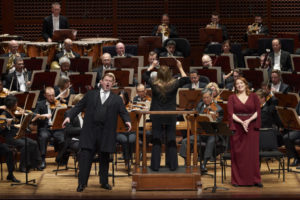
San Francisco Symphony 2019-20 Review: Die Walküre
Simone Young Triumphs In Wagner’s Masterpiece
By Lois Silverstein(Credit: Stefan Cohen)
The San Francisco Symphony showcased Richard Strauss and Richard Wagner at Davies Symphony Hall under the baton of Australian conductor Simone Young. The opening performance was a remarkable achievement with Stuart Skelton, Emily Magee, and Ain Anger shining in the first Act of Wagner’s “Die Walküre.”
Elegance Embodied
Young replaced Sir Anthony Pappano who had prior commitments in London. She dug right the minute she stepped on the podium, with the Strauss post-war “Metamorphosen.” The piece, replete with strings, spread its melancholy richness over the orchestra and audience. With its chamber feel, complete strings, no brass or winds, the whole established the work’s introspection and reflection. Not only was it a perfect complement to what would follow, but it allowed the audience to experience an engaging German melodic stream without dynamic bombast.
Young’s every movement created room for searching and meditation. She never left any group of strings or soloists – violin, cello, viola – on the margins for long. When single voices rose to the fore, she never let any group lose attention. With fastidiousness, she carved out each musical line and blended the many. Young remained energetic and more than elegant for the whole, pre-intermission piece.
Wagnerian Power
The first act of Wagner’s “Die Walküre” was treated with the same care.
Young took her place on the podium and we were off: the downbeat, the energetic thrust, the dynamism – it was inescapable. When Australian Heldentenor Stuart Skelton appeared in an elegant tailcoat, quietly gliding in, we only got more of it. Skelton’s voice soared with precise consonants; his voice swung high and low and the vowels remained enunciated and did not stretch further than they should for clear understanding.
His “Wälse” rang out as if we were in an ancient Nordic hall at the dawn of time. His “Nothung” near the end was similarly potent. Through the precision and passion of his cry, we could almost see the sword emerging from the majestic ash tree.
“Winterstürme,” the exquisite invocation to Spring, remained gorgeous, its declaration and reflection affecting and powerful. Abundantly powerful. Skelton’s choice to begin with softer syllables was distinctive and when he boosted volume from then on, his decision seemed apt and his exposition evolved further as weighty and substantive, sonorous and intelligent.
Skelton played Siegmund as the direct and passionate man he is, his simple gestures coupled with his stately posture, his sculpted facial expressions only heightening his intensity. We recognized every word.
Full of Love
What Sieglinde must have felt, we did too.
The heroine was sung by soprano Emily Magee in a performance that was equally powerful and moving. From the outset, Magee invested Sieglinde with passion and pain, melancholy, and appropriate burden. Her voice did not continuously maintain its dulcet tone, although its round and lustrous timbre captured Sieglinde’s consistent inquiring attitude; her careful observation and her steadfast attention to her guest’s needs was equally resonant.
Magee embodied the demands of her complex role- trying to satisfy her curiosity about the stranger, fulfill her duties as an appropriate hostess as well as wife to Hunding. She also expressed her down-right pleasure at looking and talking to the stranger, who kept reminding her of someone she had seen, no, known, before. Her voice ascended and floated out with range and warmth and remained suffused with pathos.
Occasionally, Magee lost her lower register as she grappled with these challenges; sometime her voice did not evince the power she tried for. Nonetheless, she always remained Sieglinde – honest, caring, striving, determined, awkward at the same time.
Bass Ain Anger exerted powerful force in his role. Tall, dark-haired, erect, he appeared and disappeared with the same angular intensity. His voice was rich and dark and provided an exquisite contrast to the soaring brother and sister. His venom remained electric. Proud and vicious, dedicated and defiant, Anger brought Wagner’s villain aright before us, mingling in the spread of those Nordic values and his patriarchial authority.
A Potent Ensemble
The San Francisco Orchestra was masterfully led by Young. The fourth voice on the stage (or perhaps the first), Young’s physical dynamics on the podium were often joyous to behold. Rhythmic and totally absorbed in what she was presenting, here was a woman who was instrumental to bringing the music right to us through her entire body; her hands and arms were only part of the package.
Throughout, the musicians remained engaged throughout the whole concert. Their music remained alive and a source of interest. The sliding harmonies, the juxtaposition of ideas set into the musical story; the sheer wealth of color and intimacy that was at once heroic and terrifying remained remarkable under Young and in her hands.
The clarity of each of the mammoth array of instruments remained intact. Bassoons, trumpets, trombones, and harps were heard clearly and with definite articulation and appropriate balance and finesse. The strings, of course, rose and fell in a sweep, enriching beyond measure. They streamed like water over the tempest the music unleashed, and which nevertheless, never lost its arc. When Siegmund roared, the orchestra kept a low profile, but when he resolved into pause and silence, there it was – active, never brittle, and soaring.
Young left no seam in Act one, and created a tapestry that would have made any composer proud. No question she provided the San Francisco crowd something to cheer about. Here’s to possibly hearing the next two Acts under her guidance.


